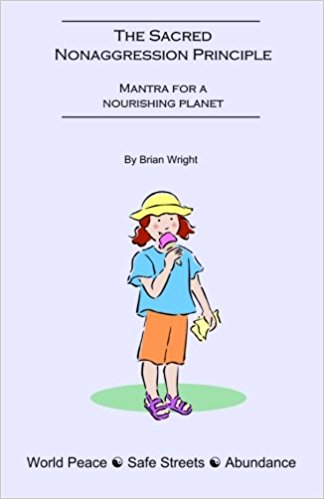Second Edition: “Mantra for a Nourishing Planet”
by Brian R. Wright
Reviewed by the author
Reposting the review from 2010, with a forenote. Namely, the general mission of the book remains as it was originally: to create a groundswell of understanding of and passion for the only principle that is worthy of human beings with independent consciousnesses, wanting to live naturally, with others as we choose, in peace and abundance. An idea whose time has definitely come and we must not let go. [All links to the inexpensive Kindle edition for easy download. Except, if you do wish to purchase the paperback, use this link here… as Amazon seems somehow to have got confused in its cataloging and linking.]
Yes, the second edition—or as I prefer to call it, the “second-first” or “kindergarten” edition (SNaP II)—of the book, the Sacred Nonaggression Principle, is finished. In this incarnation of the Sacred Nonaggression Principle (SNaP) I start with things we all learned from kindergarten: don’t hit, don’t steal, don’t lie. These “Kindergarten Rules” are the nonaggression principle (NaP) libertarians have been talking about, like, forever. But the important thing from a book-reception perspective is, “EVERYBODY UNDERSTANDS IT.
The progression of ideas in the book is as follows:
-
- Foreword and Prologue—The audience of the book breaks down into two natural groupings, those who are freedom-receptive and those already committed to the libertarian cause. A society without coercion is possible, and will be achieved as we solve the Big Universal Problem (BUP)—of political-economic tyranny.
-
- Chapter 1: Kindergarten Rules—Leading off with notions that hail from the simplest tenets humans learn from childhood. Robert Fulghum’s book Everything I Know I Learned in Kindergarten spells out: 1) Don’t hit. 2) Don’t steal. 3) Be honest. These “Kindergarten Rules” are the nonaggression principle. It makes sense to hold them in the highest regard in all of society.

